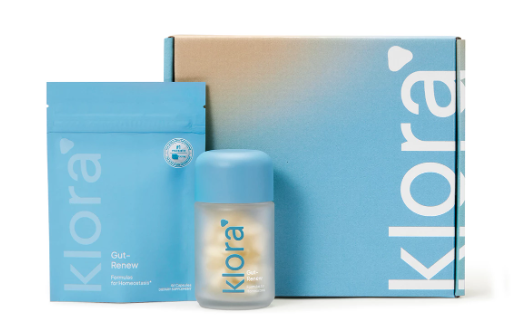Klora Gut Renew
The ingredients inside our Gut-Renew Capsules may help promote good bacterial diversity in the colon and support the cellular health of the entire digestive tract. 2’FL is a potent human milk oligasaccharide (HMO) that acts as a prebiotic. Butyrote is a postbiotic that is made from the metabolism of probiotics which create short chain fatty acids (SCFA)+.
Prebiotic
2’FL acts as a prebiotic and modulator of the adult gut microbiota. Prebiotics may help feed good bacteria, aka probiotics, in the gut. 2’FL promotes an increase in colonies of beneficial stains like bifidobacteria which helps with numerous other system in the body.*
Postbiotic
Butyrate is a short chain fatty acid (SCFA) in the form of Corebiome’s tributyrin. Butyrate is a biproduct of healthy gut bacterial metabolism. This powerful postbiotic is engineered to get down to the colon to provide strength to the gut barrier and help cellular health.
What is gut
The gut, also known as the gastrointestinal (GI) tract or digestive system, is a series of organs that work together to digest and absorb the nutrients in the food we eat. It starts at the mouth and ends at the anus.
The main organs of the gut include:
- Mouth: This is where digestion begins as food is mechanically broken down by chewing and mixed with saliva.
- Esophagus: This muscular tube carries food from the mouth to the stomach.
- Stomach: This organ mixes and grinds food, and secretes acid and enzymes to help with digestion.
- Small intestine: This long, narrow tube is responsible for absorbing most of the nutrients from the food we eat.
- Large intestine (colon): This organ absorbs water and electrolytes from undigested material and forms feces, which are then eliminated from the body through the rectum and anus.
The gut also plays an important role in maintaining the overall health of the body. It is home to trillions of beneficial bacteria, known as the microbiome, which help to protect against infections and support immune function.

Gut problems, also known as digestive problems, refer to any type of issue or discomfort that affects the digestive system. The digestive system is a series of organs that work together to break down and absorb the nutrients in the food we eat. Common gut problems include constipation, diarrhea, irritable bowel syndrome (IBS), Crohn’s disease, and ulcerative colitis.
Symptoms of gut problems can vary depending on the specific condition, but may include abdominal pain, bloating, changes in bowel movements (such as constipation or diarrhea), and nausea. Some people may also experience other symptoms, such as fatigue, weight loss, or a lack of appetite.
There are many potential causes of gut problems, including diet, stress, certain medications, and underlying medical conditions. It is important to speak with a healthcare professional if you are experiencing persistent gut problems, as they can help you determine the cause and provide appropriate treatment. Treatment may include lifestyle changes, such as diet modifications or stress management techniques, or medications to manage symptoms.



